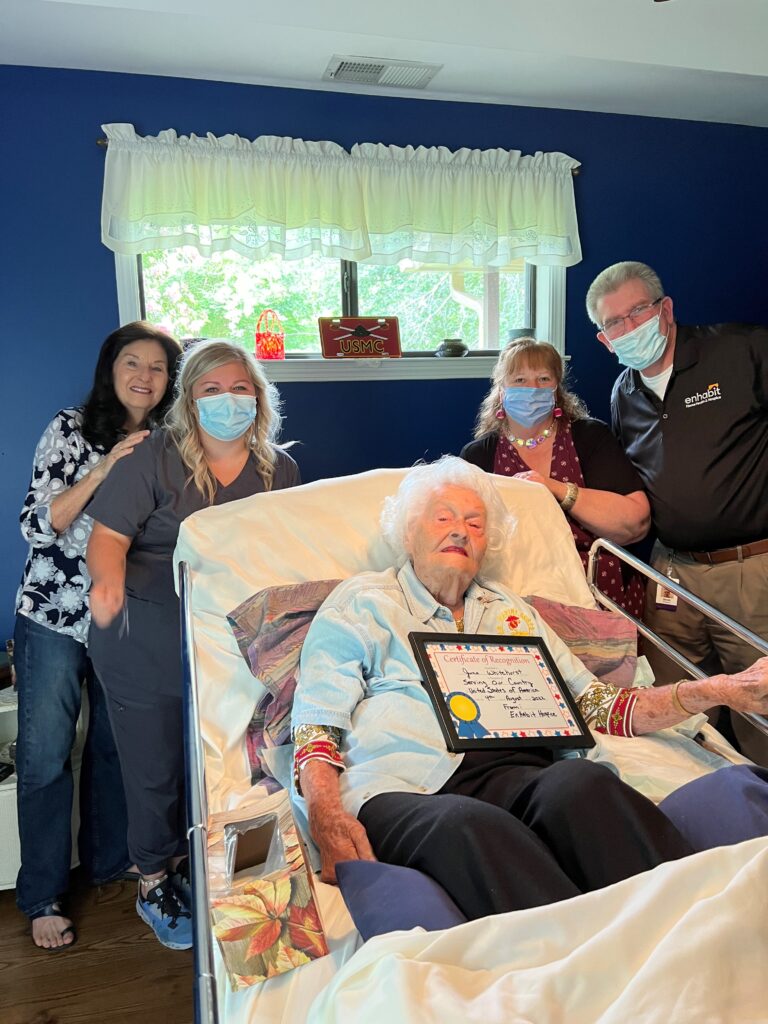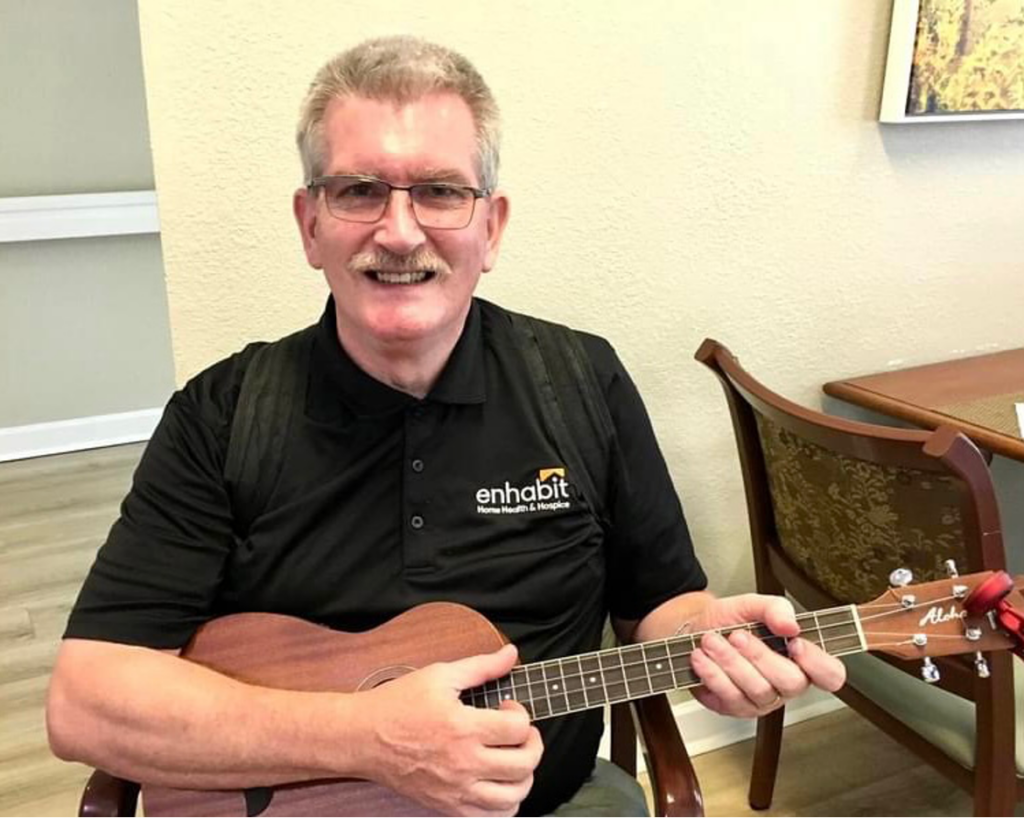When facing a terminal diagnosis, it’s common for many people to experience complex emotions. Some may turn toward spirituality for comfort at the end of life. While other members of the hospice care team tend to a patient’s physical and psychological needs, spiritual care is provided by the hospice chaplain.
Hospice chaplains are licensed professionals who plan, assess and care for a patient’s spiritual needs during their end-of-life journey. While spiritual care is covered under the Medicare hospice benefit, it is an optional service for each patient to use.
Dave is a hospice chaplain at Enhabit Home Health & Hospice. He began his career as a preaching minister, staying in that position for 10 years before moving on to be a worship minister for the next 25 years.
Dave then spent three years as a family care specialist at a transplant foundation and then found his way into hospice care
“I believe God has been preparing me to work in hospice in ways I could have never planned,” he said. “After a crash course in medical terminology, I was privileged to walk alongside thousands of families who had just lost a loved one as they made the decision to save lives through organ and tissue donation. I didn’t plan it, but the skills and experiences from those three positions provided the perfect training ground that prepared me to be a hospice chaplain.”
What does a hospice chaplain do to help patients?
Hospice chaplains serve as a valuable and compassionate resource for patients during the end of life. Their goal is to ensure patients receive the spiritual care they need according to their beliefs and wishes.

A chaplain helps guide patients by helping them explore common feelings like anger, depression or guilt. They might also address questions surrounding the meaning of life to help them find peace and comfort.
“A story from the second chapter of Job has molded my approach to providing spiritual care,” Dave said. “It says, “They sat on the ground with him for seven days and seven nights. No one said a word because they saw how great his suffering was.”
“My initial role is to notice what the patient and caregivers are going through and to listen to their story. My first concern is not sharing what spiritual wisdom I have to offer but rather finding out what they need physically and spiritually.”
By observing and identifying what patients and their loved ones are going through, Dave is able to make stronger connections with those who may not be open to talking to a chaplain at first.
“Through attentive listening, I can usually find a way to offer support that someone isn’t currently receiving,” he said. “I see one patient who loves to sing along to songs from Frank Sinatra, Bing Crosby and Dean Martin. So, I’ve learned those songs and we sing those songs. Another patient just needs someone to listen to his stories, so I listen. The opportunities I have to offer “spiritual care” to people almost always come in the midst of simply caring for people.”
What does a hospice chaplain do to help families and caregivers?
Hospice chaplains also play an important role in providing emotional and spiritual support to the patient’s family and caregivers. Families can feel a strong impact from the patient’s diagnosis. They may have the same feelings of uncertainty regarding the end of life.
Chaplains are also able to help plan memorial services and offer bereavement services for families up to 13 months after the patient passes.
While Dave assists families and caregivers through scripture, prayer and discussing funeral arrangements and memorial services, he sees the biggest impact by offering companionship and a listening ear.
“Often during this period of their life, the caregiver is spending less time in adult conversation due to their caregiving responsibilities, so they appreciate someone to talk to and having someone who will listen,” he said. “They aren’t looking for answers as much as they are wanting reassurance which comes through talking about what they are going through.”
Providing support for the rest of the hospice care team
In addition to the critical support they provide patients and families, the hospice chaplain also assists other members of the patient’s hospice care team. As they do with patients, chaplains understand the spiritual needs of their fellow team members. They also recognize the tough situations that they face every day.
“One of my first priorities when I started my role of hospice chaplain was to offer support to our entire team,” Dave said. “I am a big believer in asking about what is going on in the life of a team member and focusing on what that person is saying instead of my mind being on the busy schedule I’m trying to keep. I pray with the team as well but I think it’s the informal connections that provide the most valuable spiritual support.”
By staying connected with the care team and understanding the unique spiritual and emotional needs of each patient, the hospice chaplain can also help make informed improvements to a patient’s plan of care.
Chaplains may be able to provide insight to other members of the care team on certain medications, practices or other forms of care that may or may not align with the patient’s wishes.
Hospice chaplains can provide light in a dark time
While everyone’s end-of-life journey is different, hospice chaplains use their unique gifts to help patients receive the care they need to feel comfort and compassion in their final days.
Dave’s experience has led him to use the power of music to bring light to a dark time – both for patients and their loved ones and other members of the hospice care team.

“Nothing compares to the joy I get watching music touch people in ways that I never saw before in my 25 years as a worship minister,” he said. “I had a patient with dementia who did not speak a word to me the first two visits but when I started singing ‘Amazing Grace’ during my third visit, she started singing along.”
“Activities directors at different facilities ask me to sing to their memory care patients and the same thing happens in a group setting. I can’t tell you how much joy music brings to the memory care residents but also the staff. And if a family member happens to be there, they get an indescribable look of wonder at how music transforms their loved one.”
An indescribable career full of reward and impact
The path to becoming a hospice chaplain doesn’t always look the same for each person. However, there are some requirements that may include ordination, pastoral education or requirements for the college of chaplains.
Dave acknowledges that there are tough times and he’s still not quite used to the emotions that come with a patient dying, but the rewards he gets from guiding patients through their end-of-life journeys are indescribable.
“You get to impact people in a way that most people will never experience all because you offer support during one of the most difficult times they will ever face,” he said. “Hospice isn’t for everyone. But if you want to have a career where you can’t find the words to describe the amazing experiences you get to be a part of, give hospice a try.”
To learn more about home health career opportunities at Enhabit, search our open career opportunities near you or sign up for job alerts by texting “CARE” to 98199.
Social Share
At Enhabit our patients are our number one priority. From providing the latest medical practices to building deep personal connections, we’re focused on upholding every patient’s dignity, humanity and sense of control on their health care journey.
Home health
Our home health services give patients access to the care they deserve in the comfort of their own homes. From disease and injury management to recovery from surgery, our clinicians help patients confidently achieve their healthcare goals.
Hospice care
Our hospice care services place importance on the comfort of every patient living with a terminal illness. Our caring professionals are dedicated to providing not just physical care, but spiritual and emotional support to every patient and their loved ones.

 Back to Resource library
Back to Resource library




